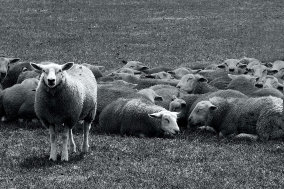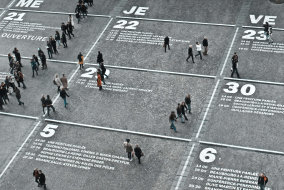Book summary of
Mastery

How to live a more fulfilling professional life corresponding to your individuality? Robert Greene discusses strategies to reach the ultimate goal: Mastery.
0. WHAT'S MASTERY?
1. THE ULTIMATE POWER
Definition of mastery: "the feeling that we have a greater command of reality, other people, and ourselves"
The three phases of mastery: student (apprenticeship) -> practitioner (creative-active phase, journeyman) -> master (mastery)
2. THE EVOLUTION OF MASTERY
Our mind is what led us to reach the top of the food chain. Its growth was triggered by our sense of sight and our needs for socialization.
Our visual system is built to think ahead to avoid predators: "the emergence of the conscious, reasoning mind". Not to merely see, but to focus deeply and pierce through things. Our social intelligence stemmed from a higher attention to detail: mirror neurons and our ability to be inside someone else's mind or to introspect/retrospect.
During Prehistory, mastery was already about making efficient decisions quickly by developing an understanding of the surrounding environment: "The body could decay but the mind would continue to learn and adapt. Using time for such effect is the essential ingredient of mastery. [...] when we trust that going through a process of months or years will bring us mastery, [...] we infallibly move to higher and higher levels of intelligence." There is no shortcut to mastery, you have to go through it and trust the process. Technology is merely a tool, it can't put in the work for you.
Mastery is not only accessible to us all, it's the meaning of life itself.
3. KEYS TO MASTERY
We are born with the same capabilities, and yet few of us reach mastery. Why is that?
It's not about IQ or natural talent, there is no relation between mastery and intelligence. It's about your personal inclination (the original meaning of the word "genius" - your unique innate qualities), an interest in a particular topic pushing you to practice harder and faster.
This intense connection is the lifeline keeping you afloat amidst the hardship. The more you nurture it, the more resilient you become.
It used to be much harder to become a master because of social reproduction. Now, knowledge is widely accessible and we have much more freedom to choose our path.
Refuting our individuality is an attempt at freeing ourselves from our responsibilities. We become passive, because it's easy and it gives us a false sense of control. Effort and discipline are pushed away to idolize self-destructiveness and instant gratification. Depression stems from our alienation from our own creative potential.
We need to feel emotionally connected to our work to strive. Mastery is about defining our own destiny, power over ourselves. We are responsible for our own actions.
The first part of the book is about finding your inner calling and how to embrace it by starting your apprenticeship. Then, the author describes how to navigate on your own to, one day, reach mastery based on the examples of established masters. Robert Greene warns the reader about mastery not being a destination but a process.
I. HOW TO DISCOVER YOUR CALLING?
1. THE HIDDEN FORCE
Mastery is a work of introspection, first and foremost. You have to trust the hidden force within you to do things your way, not how others do it.
2. KEYS TO MASTERY
Our DNA is unique, so are we as individuals. It is only logical to think we all have an inner vocation related to our uniqueness, things we are naturally attracted to from birth. We can either pursue it - it's our fate - or fall for the social pressure to conform.
Three steps: reconnect with your natural inclinations, find a corresponding career path, find your niche.
Your work shouldn't be separated from your "regular" life: it should act as a positive force and an integral part of your vocation.
Learn from others but make it your own. Don't hesitate to stray away from the way. A career is not a straight path.
Once you find your own niche, you become your own master.
We live in a world where we no longer can rely entirely on the institutions to protect us, we have to develop our own strength by pursuing our life's task. You need your uniqueness to strive.
We have to believe we have something to accomplish, no one else can give meaning to our lives. Our species evolves thanks to diversity: if we don't nurture our own, we are bound to fade away.
3. HOW TO FIND YOUR LIFE'S TASK?
Five strategies to find your vocation. It needs planning to overcome the obstacles and keep your course.
Return to your origins. As a child, you tend to be attracted to specific things. Revisit them. (Einstein => a compass, Marie Curie => her father's laboratory, Ingmar Bergman => a cinematograph, Martha Graham => a dance performance and her inability to express herself with words, Daniel Everett => a different culture => Mexican migrants, John Coltrane => another master => Charlie Parker) You need a primal connection to the subject to master it.
Occupy the perfect niche. Ramachandran => sea shells (origins) => anomalous neurological disorders (niche), Yoky Matsuoka => sport and maths (origins) => neurobotics (niche). Find a niche in your own ecology to dominate by experimenting and combining several apparently unrelated paths.
Avoid the false path. Mozart => composing (inclination) > performing (wrong path) => his father (obstacle). False path = following the wrong reasons (not according to our inclination). Realize you are on the wrong path, then rebel to overcome the obstacles.
Let go of the past. Freddie Roach => boxing (past success) => training. Don't be tied to a title, commit to your life's task. Always be adapting.
Find your way back. Buckminster Fuller => business failure, contemplating suicide => decided to pursue his own ideas no matter what. Listen to your frustration and make a radical change.
Temple Grandin found her Life's Task by focusing on her weaknesses: "ignore your weaknesses and resist the temptation to be more like others". A life's task isn't always obvious, but you will eventually stumble upon it if you find the confidence to pursue what you like.
II. SUBMIT TO REALITY: THE IDEAL APPRENTICESHIP
Apprenticeship is a practical education following the formal one.
1. KEYS TO MASTERY
Every master underwent a self-directed apprenticeship. Self-directed = "intuitive grasp of what is most important and essential in their development". All apprenticeship share common patterns => "ideal apprenticeship".
From childhood to adulthood, parents and teachers tell us what to do. Then we are thrown against reality. From a passive position we are forced to become active and independent. How to go about it? Naive approach = follow what others do, but an apprenticeship is about finding your own way.
"the goal of an apprenticeship is not money, a good position, a title, or a diploma, but rather transformation of your mind and character - the first one on the way to mastery [...] you will transform yourself from someone who is impatient and scattered into someone who is disciplined and focused, with a mind that can handle complexity. [...] you will master yourself"
Choose jobs offering the biggest learning opportunities where you can measure your progress, not comfortable ones.
2. THE APPRENTICESHIP PHASE - THE THREE STEPS OR MODES
- Deep Observation (passive mode)
When you begin a career, you enter a culture going beyond your individual aspirations. The objective is to make it yours, to understand it at a fundamental level, not to impress and make a name for yourself, but to learn.
Observe the rules, the power relationships, and follow them. It's not about judging and changing things, it's about *really* understanding them. Breaking the rules is the master's privilege. No menial task is trivial, everything is an opportunity to learn. "Submit to and absorb reality". It's about developing observational skills that will help you navigate throughout new environments.
- Skills Acquisition (practice mode)
Every human venture is about mastering skills. Skills can be more or less abstract, so you want to focus on those that can be practiced.
Tacit knowledge ("hard to put into words but easy to demonstrate in action") is the result of a learning process. During Middle Age, the apprenticeship system was designed as a learning process to acquire tacit knowledge.
An apprentice learns by watching and repeating what a master does. Example: gothic cathedrals realized without blueprints or books: tacit knowledge is transmitted "with the hands".
The natural model for learning is based on mirror neurons - watch and imitate others, then do the task repetitively. Practice and repetition, leading to a "cycle of accelerated returns": it becomes more interesting, so we practice more and become better, without end.
Rules for practice: 1) don't multitask, learn to develop your focus; 2) embrace the initial pain/boredom, it's part of it; 3) practice till it becomes automatic, it means you are ready to analyze yourself because you know what it takes, and you can start adding nuances
- Experimentation (active mode)
Do work in public, confront yourself to reality and improve thanks to the critics you receive. It's about testing your character and developing a thick skin.
Your apprenticeship is over in one location once you don't have anything new to learn. It's time to move on to new challenges.
"The future of science does not lie in increased specialization, but rather in the combining and cross-fertilization of knowledge in various fields. [...] The future belongs to those who learn more skills and combine them in creative ways."
3. HOW TO COMPLETE THE IDEAL APPRENTICESHIP?
8 strategies to complete your apprenticeship
1) Value learning over money
If you choose the biggest paycheck, you will spend your time pleasing others instead of acquiring skills, and it will be addictive. Learn to live with less and spend your time developing your expertise.
2) Keep expanding your horizons
Don't define yourself by your status, break through your limits, meet a variety of people, expose yourself to new ideas.
3) Revert to a feeling of inferiority
Learn like a child, without any feeling of superiority, live the knowledge. Don't act like a snob and always remember you know nothing, that's how you become hungry for more studies.
4) Trust the process
Don't be afraid to fail. There is always a point during the process where you don't feel like you're enough. Shut down this inner voice and don't quit. Practice some more, till it becomes an integral part of yourself. "Frustration is a sign of progress".
5) Move toward resistance and pain
Don't pass over the painful aspects of your craft, embrace the pain. Recognize your weaknesses, resist distractions and become creative with your own routine to overcome them. Push past your limits by settings impossible objectives.
6) Apprentice yourself in failure
Failures are opportunities for improvements. Keep tweaking. Act early and confront yourself to reality right away. If you fail, you are just learning.
7) Combine the "how" and the "what"
The What is the part we can see with our eyes, the How is the way it works. We always distinguish the two (front-end vs back-end, art vs science), but if we learn to overcome those divisions to combine them, we gain a much deeper insight into reality. "We must constantly ask the questions - how things work, how do decisions get made, how does the group interact?"
8) Advance through trial and error
The hacker way = learn by experimenting. Expand your possibilities by trying out new things.
There are no shortcuts to bypass your apprenticeship, it takes years of time. Even "geniuses" (Einstein, Mozart) needed more than 10 years to come up with their first great work.
III. ABSORB THE MASTER'S POWER: THE MENTOR DYNAMIC
Time is limited, use the knowledge of your predecessors, then surpass them.
1. KEYS TO MASTERY
"To learn requires a sense of humility." We have to remember there are always more experienced people out there who can teach us something. In a master/apprentice relationship, submissiveness is not a sign of weakness, it's common sense.
Mentors tailor the process to your individuality. They give you the right resources to absorb, the right direction leading to fewer distractions.
Mentors are emotionally invested in your education. They have to gain something from it: ego boost, cheap work... a form of self-interest. You need leverage to convince them to take you in: basic skills and/or strong work ethics.
A mentor is your philosophical stone.
"Intensify your level of engagement with what you are learning."
"Books can serve as temporary mentors" but you have to make them come alive by actively interacting with them: take notes, synthesize, change the support, spin it off...
At some point, the mentor hinders your growth, consciously or not. Everyone has weaknesses. When the moment comes, you have to "kill the father" to find a new one.
2. HOW TO DEEPEN THE MENTOR DYNAMIC?
Submit to the mentor's authority but always be proactive.
1. Choose the mentor according to your needs and inclinations
A mentor that enables your potential instead of putting it off - a sort of parental figure. If the mentor is too domineering, put a bit of emotional distance between you two.
2. Gaze deep into the mentor's mirror
Mastery is about reality, which is always harsh. Suffering is part of the apprenticeship, be thankful you receive it ("tough love") from your mentor because that's how you grow. Get used to criticism.
3. Transfigure their ideas
Add your own twist to the things you learn from your mentor and overcome his weaknesses you identify, that's how you build your independence.
4. Create a back-and-forth dynamic
If you manage to reach a state where you push each other to higher heights, the relationship has endless opportunities for growth.
IV. SEE PEOPLE AS THEY ARE: SOCIAL INTELLIGENCE
Emotionally draining relationships are a big obstacle to mastery. Social intelligence: the skill to see people for who they are by deeply focusing on others.
1. THINKING INSIDE
Life of Benjamin Franklin and how he used emotional intelligence to win over allies and navigate through his environment
2. KEYS TO MASTERY
Humans are social animals: mirror neurons to develop empathy and collaborate.
Naïve perspective: to exaggerate people's good and bad qualities, to always project our own emotions onto people, leading to petty fights
Social intelligence is about giving up this naïve perspective to become more realistic - outrospection.
Drama gets in the way of mastery. Stop idealizing/demonizing people and reason by first principles: "the most effective attitude to adopt is one of supreme acceptance."
A. Specific Knowledge -- Reading People
Focus your thoughts outward to fully absorb your interlocutor's words and body language.
Lower your defense mechanisms, but don't take things personally: "Resist the temptation to interpret what they say or do as somehow implicitly involving you".
Develop a habit of empathy by putting yourself in their shoes. Note their actions and decisions, they speak louder than words. Understand their motivations, their character, their values, so that you can predict their actions and develop a fruitful relationship, but don't forget people can change.
B. General Knowledge -- The Seven Deadly Realities
Negative qualities with high destructive powers, often disguised by the people wielding them.
Envy - Don't trigger envy by displaying some weaknesses in other areas. Turn to insecure types for advice and give praise. Don't make others feel stupid.
Conformism - In any social sphere, there are unwritten rules. Don't make others feel uncomfortable by questioning their values or by appearing different. Let your work demonstrate your individuality and leave politics behind during the apprenticeship phase. Beware your words, "keep your identity small".
Rigidity - Always adapt, never follow any dogma and consider alternative ways of doing things. Accept people's rigidity: don't fight it or they will pull you in.
Self-obsessiveness - When asking for help, think of ways to trigger the individual's self-interest. Make the conversation about them first.
Laziness - Beware of people with poor work ethic. They will try to take shortcuts for everything, including stealing ideas and making others do the heavy lifting. Conceal your thoughts from them.
Flightiness - Focus on people's actions, not on their words. People's emotions change frequently, you can't trust them.
Passive Aggression - Passive aggression originates from the fear of direct confrontation. Call people off when you identify a harmful behavior, or avoid them if it's in their nature. Discard the harmless exterior to analyze their acts. Flee or reflect their attacks with equal strength, but don't invest yourself emotionally.
3. HOW TO ACQUIRE SOCIAL INTELLIGENCE?
Four strategies to go past the Naïve Perspective and maintain your emotional composure.
Speak through your work - Involve others in your work by creating an emotional attachment: explain your work in a simple (shows you care for your audience) yet rigorous (demonstrates your thinking process to bring a solution) manner. Don't engage in futile battles with your opposition. Solid work is your best defense.
Craft the appropriate persona - People judge you on your appearance: wear a mask mirroring your audience's desires to make your quest for mastery easier.
See yourself as others see you - Get out of your own head and welcome criticism. We all have flaws, it's hard to discern them by ourselves, which is why we need the help of others to grow and correct them. Develop self-detachment.
Suffer fools gladly - Haters are everywhere, focus on results instead. Stupidity is part of life, remain stoïc. Ignore them, use them in your work, or turn their moves to your benefit.
Reversal: If you can't handle social situations, avoid them.
V. AWAKEN THE DIMENSIONAL MIND: THE CREATIVE-ACTIVE
Instead of remaining conservative with your knowledge, take risks by always expanding your expertise.
1. KEYS TO MASTERY
The Original Mind = the way you experienced the world as a child (curiosity, intensity, playfulness, flexibility, openness, spontaneity, but incapable of deep work)
The Conventional Mind = the accumulation of past experiences tainting our view of the world, our dogmas
Master = Original Mind + years of apprenticeship + an ability for deep work, a master can keep his mind open to new perspectives and solutions = the Dimensional Mind (discipline + childlike spirit)
Don't get trapped by conformism or the comfort of the knowledge you acquired, take on harder challenges.
The Dimensional Mind requires a high level of expertise and openness. Three steps to awake it.
1) Choose the right Creative Task - an activity maximizing our expertise
Creativity is not just a way of thinking, it's about aligning your personality with your emotions, your energy level, and your mind. If you choose the wrong creative task, your drive will fade away.
The right task to work on should be primal, an obsession that will allow you to overcome anything. Invest yourself emotionally in your work. Be intense, go all in.
If you do it primarily for money, your work will lack a soul and your public will feel it.
Choose a realistic yet highly ambitious task that will push you past your intellectual limitations.
Go past your fears and insecurities: don't limit yourself to simple tasks, ignore everyone else's opinion and social statuses, don't be afraid of periods of mental and financial instability. You can't be a pioneer if you're always stuck in your own head.
2) Develop Creative Strategies - with the aim to open up your mind
The mind tightens up over time. We attach ourselves to processes and ideas, which prevents us from envisioning new possibilities. Five strategies to overcome this issue:
Cultivate negative capability (the ability to endure and even embrace mysteries and uncertainties, to fight against confirmation bias): stop judging everything without considering opposite viewpoints, be humble, always challenge your ideas.
Allow for serendipity (the occurrence of something we are not expecting): create the right conditions for your brain to make unique associations between ideas and experiences by giving room to luck and chaos. Widen your search while maintaining an open mind, and note down any idea or observation popping up. Serendipity is the root of innovation.
Alternate the mind through "the current": the current is like a mental electrical charge that gains its power through a constant alternation [...] by continually cycling between speculation and observation/experiment, we are able to pierce deeper into reality. Don't validate an assumption too quickly but don't be afraid to speculate either. Confront your ideas to reality, constantly refine them: "it is better to produce a prototype - a form of speculation - and see how people respond to it".
Alter your perspective: don't fall into any form of cognitive bias (labeling, generalization...), try different angles. Look at the How instead of the What. Alternate between the macro (the forest) and the micro (the tree). Always question paradigms and look for anomalies. Pay attention to negative cues (what should have happened but did not, what is absent).
Revert to primal forms of intelligence: words lock us into thinking patterns. We have to re-learn to use more primal forms of intelligence, such as visual thinking. Use images, diagrams, and models to explore new aspects of reality: "To Leonardo Da Vinci, drawing and thinking were synonymous". Rely on synesthesia (when the stimulation of one sense provokes another), every sense is an opportunity to acquire a new perspective on things and develop your creativity.
3) Condition yourself for a Breakthrough
Every master experiences a creative block at some point, but they keep working and trying new approaches. At some point, you have to let go to let the subconscious mind take over, and the solution will come to you during your rest. You need a certain level of tension/intensity to grow, there is no way around it - impose yourself deadlines that will force your mind to keep up.
Emotional Pitfalls
Six pitfalls to watch out for during the creative-active phase.
Complacency: remember you know nothing and keep being curious.
Conservatism: keep reinventing yourself, don't let success and attention define you. Constantly question what you think you know, don't hold to ideas, successes, and social statuses.
Dependency: develop your own judgment, don't rely on others for approval. You have to be able to gauge the quality of your own work by taking some distance.
Impatience: the creative process requires continual deep work, so enjoy the process more than the outcome.
Grandiosity: public attention is a distraction, don't give it any worth, and don't let it feed your ego or dictate your work.
Inflexibility: be optimist yet doubtful, naïve enough to ask questions yet wise to seek the answer, etc. cultivate a flexible mindset.
Creativity is both the process and the reward. The more we create, the more we shape ourselves. Creation is a deep connection to reality and what makes us human: it's a primal need.
2. HOW TO ENTER THE CREATIVE-ACTIVE PHASE?
Nine strategies to become more creative with your skills and knowledge.
1. The Authentic Voice
Don't be impatient by avoiding the basics, put in the work. Be rigorous.
Absorb, try, and explore. Don't just imitate: personalize everything and make it yours. That's your authentic voice talking.
2. The Fact of Great Yield
Don't pursue goals, look for intriguing outliers (facts of great yield). Humans are the ultimate opportunist species: we evolve by finding and acting upon opportunities. You are no different, even as an individual: look for the anomalies we do not quite comprehend yet, follow their leads, and see for yourself where it goes. Stay open-minded, don't obsess over the destination to walk uncharted pathways. Expose the hidden realities and you will change the world.
3. Mechanical Intelligence
The Wright brothers were great examples of the hacker mindset: tiny budget, fast iterative speed, voracious curiosity, and cross-domain creativity, open-mindedness, passion for the craft...
Mechanical intelligence: create by testing and using yourself. Don't separate the design process from the practical experience or you'll lose touch with reality.
4. Natural Powers
A creative process is something you have to stumble upon, a combination of your personality, your interests, and the business needs. The start of the creative process is always open-ended: "give yourself time to dream and wander, to start out in a loose and unfocused manner". Projects, ideas, and emotions start merging together. Don't let the work turn into something boring and lifeless.
Having extensive knowledge allows you to make more associations and connections, so grow your interactions past your cognitive limits.
Don't stay idle. Keep improving or reinventing your work, never be satisfied.
Enjoy slowness, don't be impatient with results and take great pleasure in the research process.
5. The Open Field
When it comes to conventions, be subversive. Make your own niche by injecting your knowledge, skills, and personality. Don't be trapped by dogma.
6. The High End
Avoid technical locks where problems are always approached in the same way. Don't forget the bigger picture and wonder why things are done the way they are. Complex problems require cross-domain high-level thinking, so don't narrow down your research and don't be obsessed with details.
7. The Evolutionary Hijack
Creativity is evolutionary hijacking: we come upon things by accident, translating into new associations and ideas affecting our perspectives. It's all about openness and flexibility (thinking outside the box).
8. Dimensional Thinking
Looking at things from a different perspective is not the same thing as simplifying the problem at hand. Simplification is a loss of details: the whole cannot be understood without its parts. Develop more dimensions to your thinking.
9. Alchemical Creativity and the Unconscious
Creation is a form of alchemy, dust turned into gold. Alchemy is based on the idea that we can combine opposite elements to come up with a new one, it's not so different from the creative process. Don't be afraid to go against the existing paradigm and avoid labels. Mix seemingly contradictory ideas to come up with new ones.
Reversal
Myth: drugs and madness increase creativity. Creativity requires discipline, self-control, and emotional stability. It's all about routinized efforts.
VI. FUSE THE INTUITIVE WITH THE RATIONAL: MASTERY
1. THE THIRD TRANSFORMATION
A summary of Proust's life as a writer: "he was like a spider sitting on its web, feeling the slightest vibration, knowing it so deeply as the world he had created and mastered".
"He had collected over the years thousands of bits of stories, characters, lessons on life, laws of psychology, that he slowly pieced together in the novel, like tiles of a mosaic. He could not foresee the end."
2. KEYS TO MASTERY
Mastery is associated with intuition, a sensation of seeing more, without the need to focus on a single element by getting an immediate sense of the whole, a mental picture.
High-level intuition is a different form of intelligence, different from rationality. You can't analyze it, but it exists. It's not occult, anyone can develop it.
The Tao/Way: what's visible to the expert, the dynamic of how things interact with each other. It's acquired after years of absorbing tacit knowledge, to the point where it becomes unconscious, and that's where intuition comes from.
Masters are not devoid of rationality and just following their intuition, however. Intuition is a by-product of intense rational focus.
It's not merely about cumulating 10k hours, it's also about the intensity of the work: "At all points in the various moments leading to mastery, we attack with intensity. Every moment, every experience contains deep lessons for us. We are continuously awake, never merely going through the motions." You have to pay attention to whatever it is you're doing, not just merely scratching the surface, but really trying to understand what's at the core: "No moment is wasted if you pay attention and learn the lessons contained in every experience."
The Roots of Masterly Intuition
An instinct is an immediate response to an external event, an evolutionary mechanism to increase our response speed and thus our probability to survive.
Intuition stems from memory, at an unconscious level, to process complex information.
Complexity and chaos shouldn't scare you. Learn to manage your anxiety and don't be afraid of learning hard things.
Memory is primordial, but technology degrades it. Take on hobbies to counter-balance it: game, musical instrument, foreign language.
The Return to Reality
All life forms are interconnected by evolution. This interrelatedness is reality, but we tend to separate and label everything - specialized forms of knowledge.
Masters tend to do the opposite and find associations between everything. This is also the case in philosophies such as Taoism, Stoicism, the Zeitgeist, or the spirit of Renaissance (ideal of the Universal Man). Similarly, there is no distinction between us and the external world.
3. HOW TO ATTAIN MASTERY?
Mastery is a function of time and intensity. Most people follow the same path, but masters have a strong internal compass leading them to different ones. 7 strategies to make the right choices:
1. Connect to your environment - Primal Powers
Develop your ability to feel your environment. Observe well and internalize every change.
2. Play to your strengths - Supreme Focus
Determine your mental and psychological strengths and build upon them. We all have different ways of thinking and a unique personality/experience we can turn into strengths.
3. Transform yourself through practice - The Fingertip Feel
Animals do not experience a body/mind duality. With enough deliberate practice, humans can reach this state as well, where everything becomes one.
4. Internalize the details - The Life Force
Emotions stem from details. Have the patience to hone them. A lack of attention to detail will result in weak work, and your audience will feel it.
5. Widen your vision - The Global Perspective
The competitor with the best overall vision of the field wins. Understanding the dynamic, beyond the immediate moment, is controlling it: "look wider and think further ahead".
6. Submit to the other - The Inside-out Perspective
Studying from the outside is not always objective: we carry assumptions and dogmas. You have to look at things from within, to use your empathic powers to understand how things work in a given social sphere. It implies overcoming our fear of what's different.
7. Synthesize all forms of knowledge - The Universal Man/Woman
"Why should any individual stop at poetry, or find art unrelated to science, or narrow his or her intellectual interests? The mind was designed to connect things, like a loom that knits together all of the threads of a fabric." Extend your knowledge beyond your own field.
Reversal
Denying mastery is denying yourself. It's not about luck or ambition or power, it's about realizing yourself. Remaining passive is a selfish act: take control of your destiny.


























